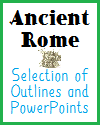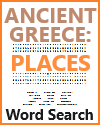| Macedonia, Alexander the Great, and the Hellenistic World |
|---|
| www.studenthandouts.com ↣ World History ↣ Ancient Greece ↣ Ancient Greece Outlines & PPTs |
|
I. Macedonia a. Macedonians were culturally and ethnically related to the Greeks i. Actually looked upon as sort of "barbarian cousins" by the Greeks of Athens, Sparta, etc. b. King Philip II of Macedonia i. Expanded his territory north to the Danube River and south into the Greek peninsula ii. Conquered all city-states except Sparta by 338 B.C.E. iii. Killed while planning to attack Persia (336 B.C.E.)  II. Alexander the Great
II. Alexander the Greata. Tutored by the philosopher Aristotle b. Precarious position because his mother was not Macedonian (making Alexander half Macedonian), and his father took a Macedonian as a new wife c. Wanted to conquer Persia like his father d. Wanted to spread Greek culture throughout the world e. Philip was killed by companions of Alexander f. Alexander came to the throne at age 20 (336 B.C.E.) III. Conquests of Alexander the Great a. First put down local revolts, including destroying Thebes b. Invasion of Persia and beyond i. 35,000 troops ii. Granicus (334 B.C.E.) iii. Issus (333 B.C.E.) iv. Arbela (331 B.C.E.) v. City-states along the Mediterranean Sea 1. Phoenician Tyre vi. Egypt 1. Founded Alexandria vii. India 1. Reached Indus River viii. Set up capital in Babylon (located in modern-day Iraq) in 324 B.C.E. c. Died of a fever in 323 B.C.E. at age 33 IV. Alexander's empire a. Fell apart after Alexander's death b. Generals fought for control of empire c. Empire divided i. Egypt—Ptolemy ii. Most of Asian empire—Seleucus iii. Macedonia and Greece—Antigonus d. New dynasties ruled for hundreds of years until conquered by Rome V. Alexander's impact on world history a. Spread Greek culture beyond the Greeks i. "Pan-Hellenism" ii. Founded numerous cities iii. Married a daughter of Persia's King Darius 1. Encouraged his soldiers to take Persian wives iv. Worshiped foreign gods and goddesses 1. Recognized as foreign incarnations of Greek gods v. Encouraged trade throughout his empire vi. Settled Greeks throughout his empire 1. Greek culture became "Hellenistic" as it spread and mingled with other cultures VI. Alexandria, Egypt a. City in Egypt founded by, and named after, Alexander the Great b. Ptolemy came to rule Egypt after Alexander's death c. Ptolemies built a university in Alexandria—"Library of Alexandria" i. Included 700,000 volumes written on papyrus ii. Center of research and scholarship VII. Hellenistic science a. Many practical, useful inventions b. Euclid (lived circa 300 B.C.E.) i. Greek who lived and worked in Alexandria, Egypt ii. "Father of geometry" 1. Theorems in plane geometry ("Euclidean geometry") c. Archimedes (circa 287-212 B.C.E.) i. Greek who lived and worked in Sicily ii. Principle of specific gravity iii. Law of floating bodies iv. Used levers, pulleys, and screws to build things such as catapults d. Eratosthenes (circa 276-195 B.C.E.) i. Greek born in modern-day Libya ii. Geographer and librarian of Alexandria, Egypt iii. Closely determined the earth's diameter iv. Measured earth's distance from the sun with 99% accuracy v. Used lines of longitude and latitude on a map vi. Believed earth is round 1. One could sail to India by sailing west e. Aristarchus of Samos (circa 310-230 B.C.E.) i. Heliocentric model—first to advocate that the earth revolves around the sun f. Hipparchus (circa 190-120 B.C.E.) i. Invented plane and spherical trigonometry ii. Predicted eclipses of the moon and sun VIII. Hellenistic art and architecture a. Architecture i. Built many impressive public buildings ii. Baths, libraries, palaces, theaters iii. Pharos—lighthouse of Alexandria – 400 feet high b. Art i. More lifelike—showed more expression ii. Action, grief, motion, pain iii. The Death of Laocoon, Winged Victory of Samothrace, Venus de Milo IX. Hellenistic philosophy a. Cynics (Cynicism) i. Diogenes (412-323 B.C.E.) ii. Hatred of power and worldly possessions b. Stoics (Stoicism) i. Zeno of Citium (334-262 B.C.E.) ii. Acceptance, courage, patience iii. Roman emperor Marcus Aurelius (121-180 C.E.) was a Stoic philosopher (wrote Confessions) iv. Stoic belief in human brotherhood influenced Christianity c. Epicureans (Epicureanism) i. Epicurus (341-270 B.C.E.) ii. No life after death iii. Pleasure and pain measure what is good and bad iv. Life is to be enjoyed, particularly by searching for knowledge X. Hellenistic literature a. Few Hellenistic works had enduring value b. Preserved classical Greek heritage i. Spread throughout Alexander's former empire ii. Particularly at Alexandria, Egypt iii. Middle East kept and preserved Greek heritage during the fall of Rome and Europe's Dark Ages 1. Europeans rediscovered this Greek heritage during the Crusades XI. Hellenistic culture in the Roman world a. Greek cities of southern Italy piqued Roman interest in Greek culture i. Many southern Italian, Sicilian, and other Mediterranean cities which came under Roman control had been founded by Greeks b. Romans spread Greek culture throughout their own empire i. Much Roman art generally copied Greek art XII. Hellenistic civilization declines a. Endured for approximately 300 years b. Wealth and power in the hands of a few c. Reliance on slavery i. Free persons could not find work ii. Slave labor cheaper (in the short-term) than investments in new inventions and technologies iii. Slave revolts d. Continuous warfare among city-states e. Easy target for Roman conquest XIII. Review questions a. Under what circumstances did Alexander the Great come to the Macedonian throne? b. Name at least three modern-day countries which were conquered by Alexander the Great. c. What does the term Hellenistic mean? d. Describe the work of a Hellenistic scientist or mathematician. e. Describe a Hellenistic philosophy. f. What caused the fall of Hellenistic society? g. Imagine that you are a Babylonian living during the time of Alexander. How might you view Alexander's conquests? Would you consider him "great"? Click here to print. This outline is three pages long and includes seven review questions. Click here for a PowerPoint version of this outline. |
 |  |  |  |  |  |
| Ancient Greece Books and Films | Ancient Greece Outlines and PowerPoints |
| Ancient Greece Maps and Pictures | Ancient Greece Study Games |
| Ancient Greece Miscellany | Ancient Greece Worksheets |
| www.studenthandouts.com ↣ World History ↣ Ancient Greece ↣ Ancient Greece Outlines & PPTs |














































